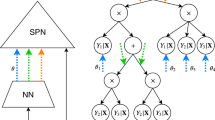Abstract
We employ graph convolutional networks for the purpose of determining the set of acceptable arguments under preferred semantics in abstract argumentation problems. While the latter problem is complexity-wise one of the hardest problems in reasoning with abstract argumentation problems, approximate methods are needed here in order to obtain a practically relevant runtime performance. This first study shows that deep neural network models such as graph convolutional networks significantly improve the runtime while keeping the accuracy of reasoning at about \(80\%\) or even more.
Access this chapter
Tax calculation will be finalised at checkout
Purchases are for personal use only
Similar content being viewed by others
Notes
- 1.
- 2.
Note that implementation-wise this is not completely true as the size of the output vector has to be fixed.
- 3.
- 4.
References
Abadi, M., et al.: Tensorflow: a system for large-scale machine learning. OSDI 16, 265–283 (2016)
Albert, R., Barabási, A.L.: Statistical mechanics of complex networks. Rev. Mod. Phys. 74(1), 47 (2002)
Atkinson, K., et al.: Toward artificial argumentation. AI Mag. 38(3), 25–36 (2017)
Besnard, P., Hunter, A.: Constructing argument graphs with deductive arguments: a tutorial. Argum. Comput. 5(1), 5–30 (2014)
Cerutti, F., Gaggl, S.A., Thimm, M., Wallner, J.P.: Foundations of implementations for formal argumentation. In: Baroni, P., Gabbay, D., Giacomin, M., van der Torre, L. (eds.) Handbook of Formal Argumentation, chap. 15. College Publications, London (2018)
Cerutti, F., Giacomin, M., Vallati, M.: Generating challenging benchmark AFs. In: COMMA, vol. 14, pp. 457–458 (2014)
Cerutti, F., Oren, N., Strass, H., Thimm, M., Vallati, M.: A benchmark framework for a computational argumentation competition. In: COMMA, pp. 459–460 (2014)
Ding, B.N.K.L.: Neural Network Fundamentals with Graphs, Algorithms and Applications. Mac Graw-Hill, New York (1996)
Dung, P.M.: On the acceptability of arguments and its fundamental role in nonmonotonic reasoning, logic programming and n-person games. Artif. Intell. 77(2), 321–357 (1995)
Dvořák, W., Dunne, P.E.: Computational problems in formal argumentation and their complexity. In: Baroni, P., Gabbay, D., Giacomin, M., van der Torre, L. (eds.) Handbook of Formal Argumentation, chap. 14. College Publications, London (2018)
Erdos, P., Rényi, A.: On the evolution of random graphs. Publ. Math. Inst. Hung. Acad. Sci. 5(1), 17–60 (1960)
Gaggl, S.A., Linsbichler, T., Maratea, M., Woltran, S.: Summary report of the second international competition on computational models of argumentation. AI Mag. 39(4), 77–79 (2018)
García, A.J., Simari, G.R.: Defeasible logic programming: DeLP-servers, contextual queries, and explanations for answers. Argum. Comput. 5(1), 63–88 (2014)
Gardner, M.W., Dorling, S.: Artificial neural networks (the multilayer perceptron) – a review of applications in the atmospheric sciences. Atmos. Environ. 32(14), 2627–2636 (1998)
Hammond, D.K., Vandergheynst, P., Gribonval, R.: Wavelets on graphs via spectral graph theory. Appl. Comput. Harmon. Anal. 30(2), 129–150 (2011)
Jain, A.K., Mao, J., Mohiuddin, K.M.: Artificial neural networks: a tutorial. Computer 29(3), 31–44 (1996)
Kipf, T.N., Welling, M.: Semi-supervised classification with graph convolutional networks. arXiv preprint arXiv:1609.02907 (2016)
Krizhevsky, A., Sutskever, I., Hinton, G.E.: ImageNet classification with deep convolutional neural networks. In: Advances in Neural Information Processing Systems, pp. 1097–1105 (2012)
Lagniez, J.M., Lonca, E., Mailly, J.G.: CoQuiAAS: a constraint-based quick abstract argumentation solver. In: 2015 IEEE 27th International Conference on Tools with Artificial Intelligence (ICTAI), pp. 928–935. IEEE (2015)
Michie, D., Spiegelhalter, D.J., Taylor, C.C.: Machine learning, neural and statistical classification. Citeseer (1994)
Modgil, S., Prakken, H.: The ASPIC+ framework for structured argumentation: a tutorial. Argum. Comput. 5, 31–62 (2014)
Niu, D., Liu, L., Lü, S.: New stochastic local search approaches for computing preferred extensions of abstract argumentation. AI Commun. 31(4), 369–382 (2018)
Schmidt, R.F., Lang, F., Heckmann, M.: Physiologie des menschen: mit pathophysiologie. Springer, Heidelberg (2011). https://doi.org/10.1007/978-3-540-32910-7
Thimm, M.: Stochastic local search algorithms for abstract argumentation under stable semantics. In: Modgil, S., Budzynska, K., Lawrence, J. (eds.) Proceedings of the Seventh International Conference on Computational Models of Argumentation (COMMA 2018). Frontiers in Artificial Intelligence and Applications, Warsaw, Poland, vol. 305, pp. 169–180, September 2018
Thimm, M., Villata, S.: The first international competition on computational models of argumentation: results and analysis. Artif. Intell. 252, 267–294 (2017)
Toni, F.: A tutorial on assumption-based argumentation. Argum. Comput. 5(1), 89–117 (2014)
Watts, D.J., Strogatz, S.H.: Collective dynamics of ‘small-world’ networks. Nature 393(6684), 440 (1998)
Acknowledgements
The research reported here was partially supported by the Deutsche Forschungsgemeinschaft (grant KE 1686/3-1).
Author information
Authors and Affiliations
Corresponding author
Editor information
Editors and Affiliations
Rights and permissions
Copyright information
© 2019 Springer Nature Switzerland AG
About this paper
Cite this paper
Kuhlmann, I., Thimm, M. (2019). Using Graph Convolutional Networks for Approximate Reasoning with Abstract Argumentation Frameworks: A Feasibility Study. In: Ben Amor, N., Quost, B., Theobald, M. (eds) Scalable Uncertainty Management. SUM 2019. Lecture Notes in Computer Science(), vol 11940. Springer, Cham. https://doi.org/10.1007/978-3-030-35514-2_3
Download citation
DOI: https://doi.org/10.1007/978-3-030-35514-2_3
Published:
Publisher Name: Springer, Cham
Print ISBN: 978-3-030-35513-5
Online ISBN: 978-3-030-35514-2
eBook Packages: Computer ScienceComputer Science (R0)




